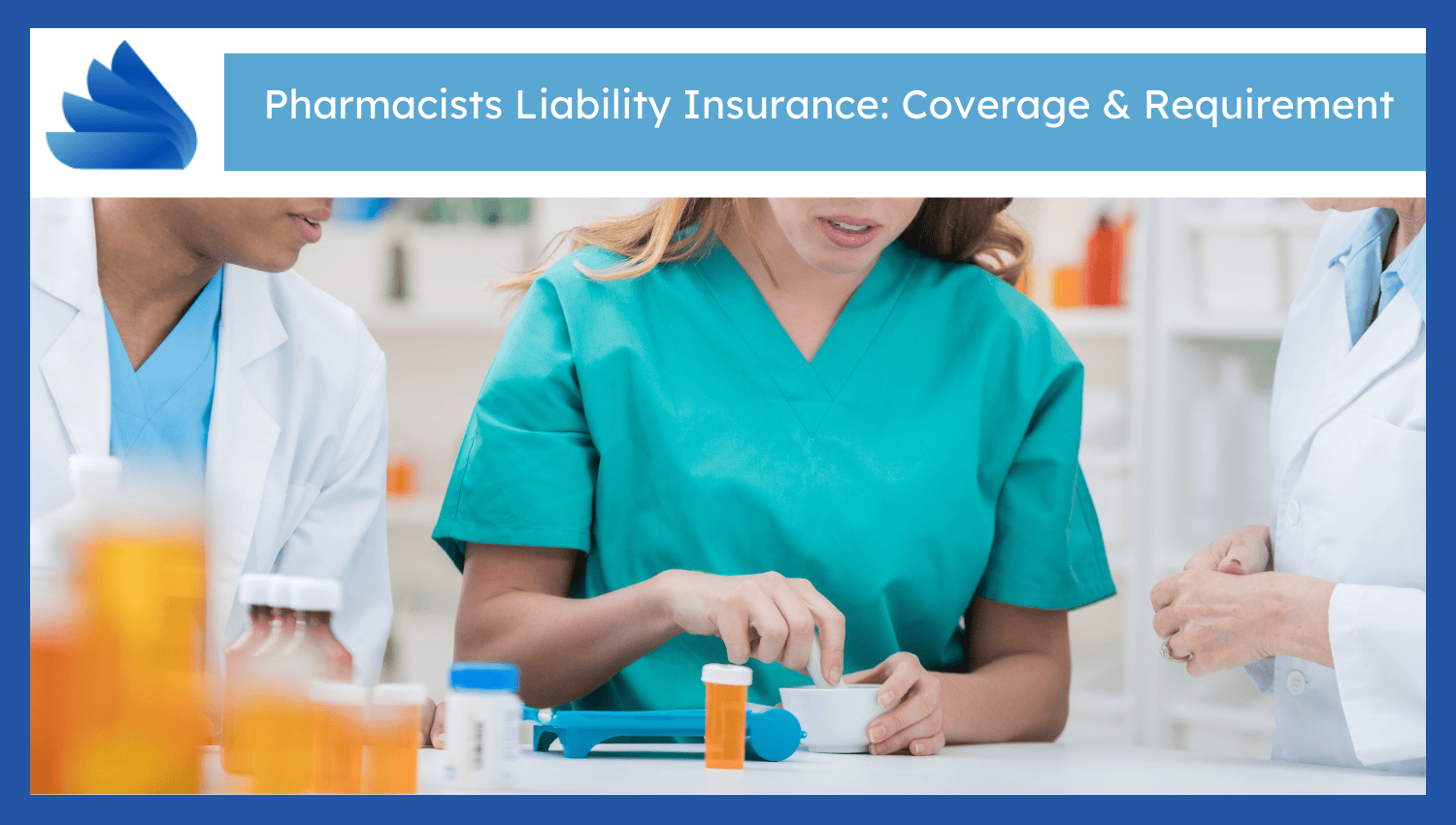
Pharmacists Liability Insurance: Coverage & Requirement
Liability insurance for pharmacists is insurance for pharmacists and their employees against allegations of professional errors. It provides legal expenses in case the patient gets injured because of the wrong medicine, wrong dose, or wrong advice. It can also be referred to as pharmacy malpractice insurance; it covers the defense costs, settlements, and court costs. This kind of insurance covers the income, license, and reputation of the pharmacist. Professionals in hospitals, clinics, and retail pharmacies use it to protect themselves against prescription errors and counseling mistakes in everyday pharmacy practice.
Why Do Pharmacists Need Liability Coverage?
The following are reasons why liability coverage is essential for pharmacists:- Responsibility for Medication Accuracy: Pharmacists have the duty of delivering the right medication and the instructions. Even simple errors can cause serious health problems.
- Risk of Patient Harm: Patients can be hurt due to incorrect medications or failure to notice warnings, and this can result in negligence claims.
- Growing Legal Exposure: There is a growing number of healthcare lawsuits. The legal action against pharmacists in the case of an error has become more common.
- Regulatory Scrutiny: Health care authorities keep a close watch on pharmacies. Even a single error can result in punishments or inquiries.
- Diverse Practice Settings: A pharmacist can work in a hospital, clinic, or retail outlet. There are legal risks associated with each setting.
What Does Pharmacist Liability Insurance Typically Cover?
Here are the main areas covered by pharmacists' professional insurance:- Medication or Dosage Errors: Protects against cases when a pharmacist prescribes incorrect medicine or an incorrect dosage. When the patient is harmed as a result of this mistake, the insurance helps with legal bills and medical expenses.
- Missed Drug Interactions: Covers the drug interactions of a pharmacist who does not recognize harmful medication combinations. The policy covers financial costs in case of a harmful interaction that failed to be flagged and injured a patient.
- Labeling and Instruction Mistakes: This includes the mistakes that are made by labeling them incorrectly, wrong name, wrong dose, or using unknown instructions. When the right instructions are not given, the given coverage assists in managing claims that can arise because of misuse.
- Patient Counseling Errors: This coverage assists when a pharmacist provides incorrect or incomplete information to use a certain drug, which results in side effects, an overdose, or any other health issues.
- Compounding Negligence: It applies to pharmacists who make custom medicines. When the mix is improper or contaminated and the patient suffers as a result of this, the policy covers the claim costs.
- Legal and Settlement Costs: It covers legal defense, attorney costs, and any payment or court-ordered compensation in the event of a patient filing suit against the pharmacist over a covered mistake.
What’s Not Covered by Pharmacists' Professional Insurance?
Here are the common exclusions by pharmacists' professional insurance:- Criminal or Intentional Acts: The policy excludes any criminal acts or any intentional harm, including administering the wrong drug or damaging medications.
- Sexual Misconduct Claims: Any claim that deals with sexual misconduct or harassment is not covered and needs to be addressed through other legal means.
- In-Pharmacy Accidents: Professional liability does not cover injuries such as slips and falls in the pharmacy. These are included in general business liability insurance.
- Cyber Incidents: They do not include data breaches, hacking, or leaks of patient records. These events require individual cyber liability insurance.
- Employment-Related Issues: This policy does not cover the issues of wrongful termination, discrimination, or colleague conflict. They need employment practices liability insurance.
- Product Defect Claims: When a drug or other product dispensed by the store harms someone, it is the result of a manufacturing problem, and the liability policy does not cover it. It is the duty of the manufacturer.
Who Needs Pharmacist Liability Insurance?
Here are the professionals who benefit from this coverage:- The retail pharmacists who operate at the community drugstores have heavy prescription loads and direct contact with patients.
- Hospital and clinical pharmacists deal with intricate drugs and work with medical teams, putting them at a higher risk of liability claims.
- Compounding pharmacists prepare individualised medicines, putting them at risk of formulation or contamination claims.
- Pharmacy owners or franchisees have liability not only on their own part but also on the employees and activities under their license.
- Pharmacist consultants or educators can guide, train, or provide an expert opinion, which can be objected to when results become faulty.
- Pharmacy interns and technicians also participate in daily prep and dispensing activities and can be legal targets even during training or support activities.
What to Look for in a Pharmacist Insurance Policy?
Here are the important features to consider when choosing pharmacist liability insurance:- Check for sufficient coverage limits that can cover any major claims, including legal fees and payments, without leaving any financial gaps.
- Ensure that defense expenses are more than policy limits, so that legal costs do not cut into the payout to claims.
- Add board investigation coverage to remain safe when a pharmacy board is reviewing or punishing a person professionally.
- Make sure there is specialty practice protection when you sell services such as compounding, consulting, or clinical support.
- Select a plan that has experienced legal assistance from lawyers who are aware that pharmacy laws and risks are involved.
- Choose a company that has good consumer reviews and previous experience with pharmacist liability insurance.

